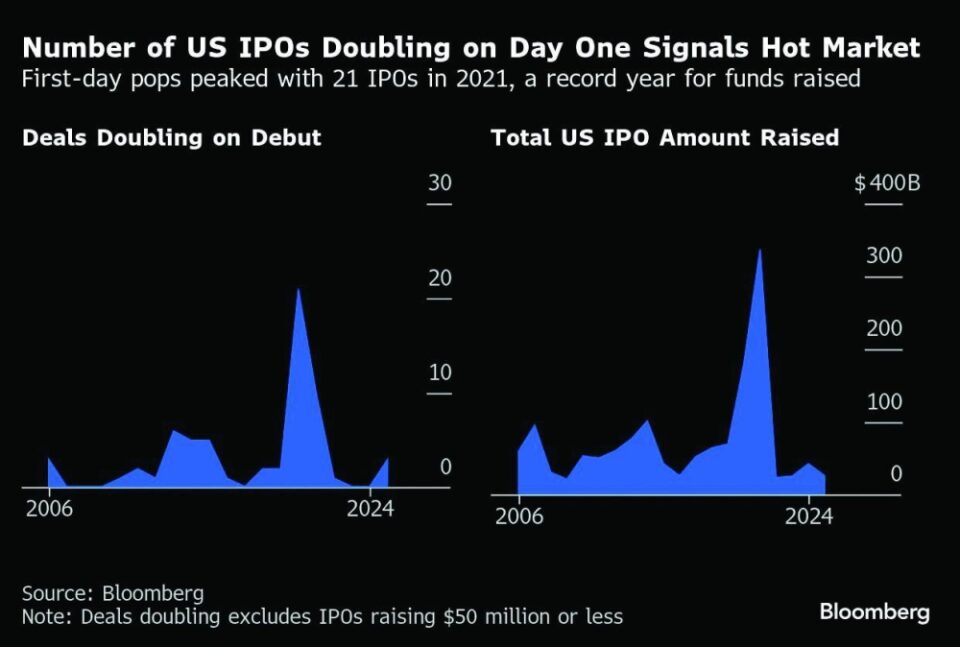Stocks of newly-public companies are surging in their first sessions at the fastest pace in three and a half years, enthralling traders and heating up the market for US first-time share sales.Drone maker Airo Group Holdings Inc ended on Friday with a gain of 140%, a day after raising $60mn in its initial public offering, and coming barely a week after stablecoin issuer Circle Internet Group Inc surged 168.5% immediately following its $1.2bn IPO.With conservative cable channel Newsmax Inc’s wild 735% opening gain in March, following its $75mn offering, three companies raising at least $50mn on US exchanges this year have more than doubled on their first trading day, according to data compiled by Bloomberg. That’s the most since nine US-listed debutantes managed the feat in 2021’s IPO boom.These spectacles may be thrilling to watch, but history shows extreme day-one pops rarely reward investors in the long run.Professional traders and retail investors often drive a first-day rally, snapping up the stock as early as they can and riding the momentum. Most of these buyers weren’t able to get their hands on the shares during the IPO itself, however. That’s because companies prefer to allocate shares sold in IPOs to mutual funds that base their investment strategies on a fundamental view of a company’s prospects, and that, notionally at least, have committed to remain long-term backers.Not surprisingly, outsized first-day performances fuelled by momentum and retail buying offer a poor guide to a company’s long-term prospects.Between 1980 and 2023, there were 316 companies listing on US exchanges whose shares doubled in their first day of trading, excluding those with offer prices below $5 per share, units and American depositary receipts, according to data compiled by Jay Ritter, professor of finance at the University of Florida.Nearly 90% of these IPOs had negative three-year buy-and-hold returns versus the price at which they closed their opening session, and the average loss was a painful 46%, Ritter’s data showed.A cluster of first-day doubles usually coincides with market peaks like the Internet bubble of 1999 and 2000, when more than 100 companies that doubled in price, though most faded into obscurity, Ritter said.Firms likely to pop include fast-growing companies with retail-investor enthusiasm, Ritter said, citing Newsmax as a recent example.“What’s true about most of these companies is that they are not mature and they are hard to value.”Numerous companies that rewarded investors richly on debut ran into financial difficulties that made a mockery of investors’ early optimism.Online used car retailer Vroom Inc, which returned 118% in its first day of trading post-IPO in June of 2020, is a representative example. The company filed for Chapter 11 last year, and emerged in January after completing a recapitalisation that included an arrangement similar to a one-for-five reverse stock split.Living up to the promise implied by stunning day-one pops can prove hard even for corporate titans.Airbnb Inc and Snowflake Inc were the highest profile of the nine 2021 IPOs that doubled in their first session, but their shares now trade a little below that day-one closing price.A few companies with day-one doubles do become lasting winners. Chipotle Mexican Grill Inc did so well in the years since its debut in 2006 that it announced a 50-for-one split last year.In Airo’s case, some of it was good timing. The IPO came just days after President Donald Trump issued executive orders to promote the domestic drone business, and as an escalating conflict in the Middle East underscored the value of cutting-edge drone technology.“I don’t think we expected it to go up that much,” Chirinjeev Kathuria, Airo’s executive chairman and co-founder, said in an interview with Bloomberg News on Friday.The company also allocated 70% of the 6mn shares to just five investors, people familiar with the offering have said.“We went with a smaller offering size to bring in long-only investors that believe in the story,” Kathuria said.After April’s extreme volatility that brought the market for first-time share sales to a halt, a few weeks of relative calm helped revive enthusiasm for IPOs.Companies were looking to take advantage of an open market window that could close quickly, according to Greg Martin, the managing director of private markets trading platform Rainmaker Securities. The current crop of IPOs were generally coming at attractive discounts relative to peers, Martin said.

previous post